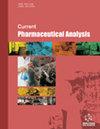验证测定人血白蛋白成品中铝含量的 GF-AAS 方法
IF 1.5
4区 医学
Q4 PHARMACOLOGY & PHARMACY
引用次数: 0
摘要
背景:从血浆中分馏出的纯化人血白蛋白具有复杂的基质,在质量控制测试中会受到很多干扰,尤其是对痕量杂质的干扰。本研究采用石墨炉原子吸收光谱法(GF-AAS)研究并验证了一种简单的铝含量定量方法。根据国际准则,对线性、准确度、精确度、特异性、检测限和定量进行了评估。结果如下在 5 微克/升至 45 微克/升的浓度范围内,对分析物的线性响应进行了评估,得到的相关系数大于 0.99。三个浓度水平的平均回收率为 102.29% 至 106.81%。对其他金属离子可能造成的干扰进行了特异性/选择性评估,高含量和低含量的相对标准偏差分别为 10.24% 和 6.50%,经统计验证无显著性差异。对方法的精密度进行了重复性和中间精密度评估,得到的相对标准偏差分别为 1.83% 和 4.61%。检测限和定量限分别为 1.30 μg/L 和 4.10 μg/L。结论方法的性能结果表明该方法适用于人体白蛋白样品中铝的测定,可用于控制人体白蛋白血液制品中铝的含量。本文章由计算机程序翻译,如有差异,请以英文原文为准。
Validation of GF-AAS Method for the Determination of Aluminium Content in Human Albumin Finished Product
Background: Purified human albumin fractionated from plasma has a complex matrix that imposes a lot of interference in quality control testing, particularly for impurities at trace level. In this study, a simple approach has been studied and validated for the quantification of aluminium content using Graphite Furnace Atomic Absorption Spectrometry (GF-AAS). As per international guidelines, the linearity, accuracy, precision, specificity, limit of detection, and quantification have been assessed. Results: The linearity of the analyte response was evaluated over the range of concentrations from 5μg/L to 45 μg/L, and the correlation coefficient obtained was greater than 0.99. The mean recovery obtained for the accuracy ranged from 102.29% to 106.81% at three concentration levels. The specificity/selectivity evaluated for possible interference from other metal ions and relative standard deviation for the high and low content was 10.24% and 6.50%, respectively, which was statistically verified and not significant. Method precision was evaluated for repeatability and intermediate precision, and the relative standard deviation obtained was 1.83% and 4.61%, respectively. The limit of detection and quantification obtained was 1.30 μg/L and 4.10 μg/L, respectively. Conclusion: Results obtained for the method performance show the suitability of the method for aluminium estimation in human albumin samples and should be used to control the limit of aluminium in human albumin blood products.
求助全文
通过发布文献求助,成功后即可免费获取论文全文。
去求助
来源期刊
CiteScore
1.50
自引率
0.00%
发文量
85
审稿时长
3 months
期刊介绍:
Aims & Scope
Current Pharmaceutical Analysis publishes expert reviews and original research articles on all the most recent advances in pharmaceutical and biomedical analysis. All aspects of the field are represented including drug analysis, analytical methodology and instrumentation. The journal is essential to all involved in pharmaceutical, biochemical and clinical analysis.

 求助内容:
求助内容: 应助结果提醒方式:
应助结果提醒方式:


